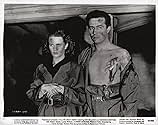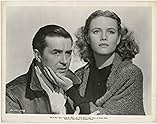Occupied France, World War II. The American pilot John is shot down and taken to a convent by the Resistance. The young novice Clothilde is interested in him and is willing to help him escap... Read allOccupied France, World War II. The American pilot John is shot down and taken to a convent by the Resistance. The young novice Clothilde is interested in him and is willing to help him escape to England. John passes as being the husband of Madame Bouchard, a woman from the next v... Read allOccupied France, World War II. The American pilot John is shot down and taken to a convent by the Resistance. The young novice Clothilde is interested in him and is willing to help him escape to England. John passes as being the husband of Madame Bouchard, a woman from the next village.
- Director
- Writers
- Stars
- Orphan
- (uncredited)
- Françoise
- (uncredited)
- Mme. Bouchard
- (uncredited)
- Refugee
- (uncredited)
- Jeannette
- (uncredited)
- German Soldier
- (uncredited)
- Elderly Waitress
- (uncredited)
- Mme. Sarroux
- (uncredited)
- Gaston - the Waiter
- (uncredited)
- Orphan
- (uncredited)
- Director
- Writers
- All cast & crew
- Production, box office & more at IMDbPro
Featured reviews
The film started well with Mother Superior Lucile Watson setting the scene in her church. However, once Milland appears the film just drops away, I'm afraid to say. I expected better. Britton goes on the run with Millan and the film's pace just comes to a halt at this point. Instead of cranking up the tension, we get Milland boring us senseless with his views on romance and marriage. This is all meant to be for the benefit of Britton's naïve nun character. This was pretty dull stuff and I fell asleep during this nonsense. When I awoke, he was still prattling on. Yawn.
The story is predictable, daft and pretty stupid when you see the decision that Britton makes when there is a boat waiting to take her away. Nazis are portrayed as cartoon shouty characters and the ending will make you cringe as we are forced to believe that Britton is relieved. I don't think so.
Just before the film, I had cooked some squid. I put the squid into a saucepan with an onion and let it heat for 30 minutes with some garlic, chilli and Italian herbs. I then returned and added some tomato sauce and cooked for a further 30 minutes so as to give the flavours a good opportunity to soak in. After the squid had been cooking for an hour, I then added some Madeira wine and left it for a further 20 minutes, after which the meal was ready and I served it with Rigatone. It was beautiful. It may also have caused me to fall asleep during the boring part of the film. I would like to recommend to readers that they make the same meal and pour a whole bottle of Madeira wine into the recipe. You can then fall asleep to the whole film although you may not need the prompt once Milland starts his waffling. You will miss nothing, unfortunately, as the film is a disappointing effort but you will have had a fantastic meal.
It's one of Borzage's most highly spiritual works, and the setting of a convent (in the beginning), the focus on the nun, the awesomely spiritual communion of the lovers heightens its sense of spirituality. The photography (as always) is haunting and painterly. Britton & Milland are fabulous together; they make a lovely yet vulnerable couple that we can sympathize all along. The most memorable moment is the scene where Milland explains to her what marriage means to him. The way he defines marriage, the eloquence of his speech, the highly erotic scenes between them, not to say the remarkable radiance of Britton's face, are just sublime.
I thought the ending was rushed and problematic; it didn't make sense to me. However I was very pleased with the rest of the film. I heartily recommend "Till We Meet Again", especially to Borzage fans, if you get a chance to watch it.
The greatest asset, though, is the story, which is a triumph of war thriller intrigue mixed up with existential and moral issues, an occupational force testing the conscience of the victims. The film has been criticised for its one-sided view of the Nazis as thorough villains and bullies and nothing else, but any occupational force is like that. There has never been any exception. Their banditry adds tension and drama to the film, but that is not their only function. That's how they were. Ask any Frenchman.
A superb film and one of Frank Borzage's best. Surprised that it is not better known.
This is a most unusual wartime picture, as it presents a romance, of sorts, between a soldier and a nun...though it never really develops. I assume it is because the filmmakers worried about how the public would accept such a romance. And the ending...well it is downbeat but also keeps the film from being a typical propaganda film with cardboard Nazis. Well worth seeing.
This is one of those rare wartime films, made and released during the war, that focuses more on the drama of personal lives than on combat and military action. In the order of appearance, the film closely explores four people. The first is Lucile Watson as the Mother Superior of a convent orphanage in France. The second is Barbara Britton as Sister Clothilde who had come to the orphanage as a child years before. Next is Walter Slezak as Mayor Vitrey, the local ordinary who is under the thumb of the Germans. Lastly is Ray Milland, an American airman, John, whose plane was shot down. Two other characters of significance are Vladimir Sokoloff as Cabeau and Konstantin Shayne as German Major Krupp.
At the time of this film - in it and in real life, German forces had moved into Southern France as well to defend against an invasion from the Mediterranean. But, Mayor Vitrey and the Vichy government were still the token government administrators of the region.
The film is a good wartime look at the French Underground and its operations in Southern France under the Vichy government. The main story is about a network that helps downed Allied airmen and others being hunted by the Nazis, to escape. Plots within that story include a Catholic convent with nuns running an orphanage for homeless children and those whose parents have died. Another is the underground dislike and distrust by the people for the French Vichy government.
Sister Clothilde has never left the convent since her childhood. But she is forced to help John escape when the woman who had been arranged to pose as his wife was arrested by the Gestapo. In their journey to escape, the John talks about his wife and baby boy back home. The nun learns something about the love between husband and wife, and sharing that with children.
This is a very good film about wartime oppression and suffering, resistance to an enemy, and with strong overtones of freedom, faith and family.
The only drawback to the film is the stage setting feel for some scenes. Of course, that was a time when most movies were shot on sound stages and very little acting was done and filmed in realistic outdoor settings. But otherwise, this film scores high in all aspects. The acting is very good all around. The plot and screenplay are first-rate and the direction, camera work and other technical aspects are superb.
The film has a sort of surprise ending, but a very appropriate and moving one. And one special scene in the screenplay is worth noting. Milland's John gives one of best, moving and heartfelt descriptions of marriage ever put on film.
Here are some memorable lines from this film.
Mother superior, "After the last war, I thought I was through with the Germans." Major Krupp, "One is never through with the Germans." Mother superior, "That is what our gardener says about the blight that attacks our roses, but we must struggle against it just the same."
Mother superior, "The size of the flea has no relation to its bite."
Mayor Vitrey, "As mayor of the village, it is also very distressing for me." Major Krupp, "No, Vitrey, for you as mayor, it is unhealthy."
Vitrey, "Th... they talk about me in the village? What do they say?" Mother superior, "I never listen to slander." Major Krupp, "Ha, ha, ha! You are a fool, Vitrey, to try and match wits with reverend mother."
Mother superior, "This is my third war. Everything changes but the Germans."
Gaston, the waiter, "They're all the same, those Nazis. They try to act like conquerors. They know they have conquered nothing. They are lonely, homesick and hated."
Sister Clothilde, "I feel lost." John, "You shouldn't. God is everywhere. And everything outside the convent isn't ugly and frightening and sinful. And marriage must be right or it wouldn't be a sacrament of the Church. I took vows too, you know, and kept them. Marriage can be the most, well the most beautiful thing in the world. It's like finding your other self, and once you've found her you're only half a person without her.
Did you know
- TriviaOne of over 700 Paramount Productions, filmed between 1929 and 1949, which were sold to MCA/Universal in 1958 for television distribution, and have been owned and controlled by Universal ever since. Its initial telecast took place in Omaha Thursday 27 November 1958 on KETV (Channel 7); in Minneapolis it first aired 27 May 1959 on WTCN (Channel 11), in Phoenix 31 May 1959 on KVAR (Channel 12), in Seattle 23 June 1959 on KIRO (Channel 7), in Asheville, North Carolina 12 July 1959 on WLOS (Channel 13), in St. Louis 21 July 1959 on KMOX (Channel 4), in Detroit 21 September 1959 on WJBK (Channel 2), in Toledo 1 November 1959 on WTOL (Channel 11) and in Milwaukee 26 November 1959 on WITI (Channel 6).
- Quotes
Mother Superior: The size of the flea has no relation to its bite.
Details
- Release date
- Country of origin
- Languages
- Also known as
- Till We Meet Again
- Filming locations
- Production company
- See more company credits at IMDbPro
- Runtime1 hour 28 minutes
- Color
- Aspect ratio
- 1.37 : 1
Contribute to this page




























